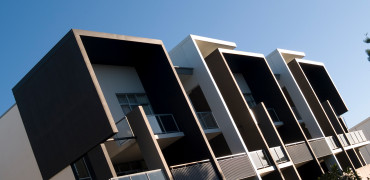A lot of social landlords are already using renewable technologies such as solar PV, solar thermal, biomass and ground and air source heat pumps because they are proven to be able to help combat fuel poverty, especially in off-gas areas.
Part of this drive was undoubtedly a result of the previous Code for Sustainable Homes, which forced social housing landlords to look at the green credentials of new developments. At the time of the Code’s demise, HA’s were expected to achieve Code Level 4, which made the use of gas boilers in new-build almost completely unviable and lead to a significant rise in the number of air source heat pumps installations.
With the Code now consigned to history and no clear replacement at this stage, many landlords are still adhering to Code Level 4 as a benchmark for new-build.
However, this leaves thousands of older properties still requiring an upgrade before they can fully benefit from renewable heating.
For the housing association, they can not only earn the regular income from the property, they can rest assured that they are helping tackle fuel poverty in a way that can also benefit their housing stock
Renewable Heat Incentive
What we do have from Government though, is the Renewable Heat Incentive (RHI), which means HA’s can receive a quarterly income from every kilowatt of renewable heating each property produces using approved, renewable technologies.
Forward-thinking HAs have been therefore able to justify the initial capital expenditure on upgrading windows, insulation and installing heat pumps, by building the RHI payments into their forward budget planning.
The latest Government tinkering with the RHI earlier this year saw a 33% rise in the rates for air source heat pumps and places this technology firmly in the vanguard of the renewable revolution.
Gas boilers are still the dominant force in the domestic heating market with around 1.5 million units sold each year. However, the Government has forecast that by 2030, the use of air source heat pumps to provide heating for UK homes will rise to over one million units per year.
At the same time, the way we as a country produce electricity is becoming greener, which increases the benefits of air source heat pumps further as a renewable technology and brings the demise of gas boilers as the default heating, even closer.
At the end of April, the UK generated a whole day of electricity produced without burning a single lump of coal – a landmark moment and the first working day this has happened since 1882.
So heat pumps are on the up, backed by the Committee on Climate Change and with the electricity needed to run them coming from more and more renewable sources.
Still need convincing
But if you or your tenants are still unsure, is there anywhere you can go for help and advice?
The market leader in air source heat pumps by far is Mitsubishi Electric, with its Ecodan range which can be fitted to almost any property and can also be used in a hybrid situation with the existing heating system. The company has produced a special brochure for homeowners and tenants focusing on the benefits of air source heat pumps.
“In addition to helping with newer homes, this can offer landlords a quick renewable fix for older properties on the gas-grid, with funding from the RHI helping to significantly reduce the payback period,” explains Sharon Oliver, marketing manager for the Ecodan brand.
In a hybrid system, the heat pump is added to an existing heating system, with the advanced controls in the heat pump able to decide when it is most efficient and effective to use the heat pump over the existing heating system.
“This provides reassurance to the tenant whilst bringing them the benefits of fully controllable heating throughout the home, all year round,” adds Oliver.
For the housing association, they can not only earn the regular income from the property, they can rest assured that they are helping tackle fuel poverty in a way that can also benefit their housing stock by reducing property damage from damp and mould. Heat pumps can also reduce annual maintenance costs as there is no need for a gas safety certificate.
Frequently Asked Questions
Mitsubishi Electric has also produced a website for tenants and homeowners, explaining how a heat pump works and answering all of the frequently asked questions that tenants are likely to ask.
The website includes short videos which not only focus on noise levels and controls, it explains how a heat pump works; how much heat you will get for the home; how hot the radiators should be; and how the technology works when its cold outside (this particular video was filmed whilst snow was on the ground!).
The company’s technical experts have also visited hundreds of tenant groups around the country to show people the technology and answer questions face to face.
Even more benefits
As we have previously reported in Housing Association, the benefits do not stop there as the ‘Touching the Void’ report from Sustainable Homes clearly shows. The report can be downloaded at http://www.sustainablehomes.co.uk/research-project/rent-arrears/
The research examined data from over 500,000 homes, looking at benefits of energy efficient homes for social landlords’ income. The study found that:
- as homes become more energy efficient they are void for a shorter length of time – on average, 31% shorter for band B properties compared to those in bands E and F
- landlords with more energy efficient stock spend less on refurbishing void homes, less on repairs and less on staff time to manage voids
- rent arrears are on average half a month higher in Band F properties than in other bands
- other cost savings identified include time spent seeking overdue rent payment, legal costs and court costs which decline by around 35% for more energy efficient homes
So, if you are already using air source heat pumps for your new-build properties, is it now time to consider the technology for on-gas properties too?
And if you haven’t yet looked at heat pumps, isn’t it time you asked your peers in the industry what their experience has been? Alternatively, get in touch with the manufacturers and talk to them yourself.
Click here for more information on the Ecodan range of air source heat pumps.
Joe Bradbury is Assistant Editor of Housing Association Magazine.
If you have any questions about this article, you can contact us via email. Or if you would like to tweet us, please follow our MEUK_LES twitter page.
We upload new articles every week so remember to check back regularly.
You can also sign up for our monthly newsletter below.


